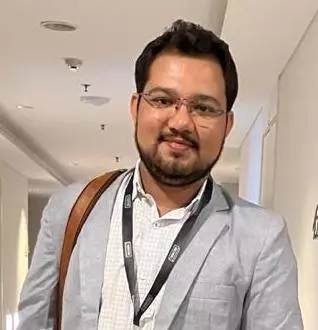
Honeywell's FT Unicracking technology: Redefining SAF production
Launched in April 2024, Honeywell's new FT Unicracking technology transforms SAF production, tackling feedstock limitations and high costs.

According to IATA, sustainable aviation fuel (SAF) has the potential to contribute to approximately 65% of the emission reductions required to achieve net-zero carbon emissions by 2050. In response to this critical need, Honeywell is redefining SAF production with its innovative Fischer-Tropsch Hydrocracking technology, FT Unicracking.
In April this year, Honeywell announced this latest SAF production technology, offering a solution to the challenges of limited traditional SAF feedstocks and high production costs.
In an interview with The STAT Trade Times, Ranjit Kulkarni, Vice President & General Manager of Energy and Sustainability Solutions at Honeywell India, discusses how this technology can change the landscape of renewable aviation fuels and pave the way for a greener future.
1. How does Honeywell's hydrocracking technology address the challenge of limited traditional SAF feedstocks?
Considering the increasing demand and scarcity of conventional sources like vegetable oils, animal fats, and waste, Honeywell's Fischer-Tropsch (FT) Unicracking technology converts Fischer-Tropsch liquids and waxes from processed biomass such as crop residues, wood waste and food scraps into SAF.
Materials like biomass and municipal waste are sent to the Gasifier to generate syngas. This syngas, a mixture of CO and H2, is further processed in a commercially proven Fischer Tropsch process to generate FT liquids and waxes, which are subsequently upgraded to SAF via Honeywell's FT Unicracking technology. An alternative pathway is taking CO2 and H2, sending that to a reverse Water Gas Shift reactor to again generate syngas, and subsequently sending that to a Fischer Tropsch unit followed by Honeywell FT-Unicracking.
A recent Energy Industries Council report highlighted the hurdles of high costs and restricted feedstock availability in scaling global sustainable fuel production. By integrating hydrocracking with the existing Fischer-Tropsch process, Honeywell's latest technology expands the spectrum of feedstock options accessible to the industry. This strategic combination ensures a sustainable supply and enhances the capacity to meet the escalating demand for SAF.
2. How does Honeywell's hydrocracking technology differ from other SAF production methods?
Honeywell's FT Unicracking technology stands out for its ability to produce more SAF at a lower cost and with reduced waste by-products. This proven technology pathway is commercially viable and offers significant advantages over alternative methods, including repurposing existing assets for those in the traditional refining industry.
While this is the first use of Unicracking to create SAF from Fischer-Tropsch liquids, Honeywell's Unicracking process was introduced in 1964. It was designed to produce higher yields of transportation fuels that adhere to tighter regulations using a more comprehensive range of feedstocks.
3. Can you elaborate on the cost savings and efficiency improvements enabled by Honeywell's hydrocracking process compared to other SAF production methods?
Honeywell's hydrocracking process holds immense promise for the aviation industry. It offers a pathway towards SAF production that is not only more cost-effective and efficient but also 90% less carbon-intensive than traditional fossil-based jet fuels.
Honeywell's FT Unicracking technology produces 3-5% more SAF while simultaneously reducing costs by up to 20%iii compared to conventional FT-hydroprocessing methods. This significant reduction in production costs is crucial for making SAF more economically viable and competitive.
Moreover, the technology plays a pivotal role in ensuring the quality and compliance of the produced SAF with stringent aviation industry standards. By employing this advanced technology, SAF can be manufactured with a reduced environmental footprint, enhancing its appeal as a sustainable alternative to traditional fossil-based jet fuels.
4. What role does DG Fuels' selection of Honeywell's technology play in advancing the production and adoption of SAF on a global scale?
DG Fuels' selection of Honeywell's FT Unicracking technology marks a pivotal moment in advancing the production and adoption of SAF for their upcoming biofuel facility in Louisiana.
With their facility expected to be the largest of its kind worldwide, DG Fuels aims to produce 13,000 barrels of SAF daily starting in 2028 from FT Liquids and Waxes.
By leveraging Honeywell's advanced technology, DG Fuels will have the capacity to supply enough SAF to power over 30,000 transatlantic flights annually, making a significant dent in the aviation industry's carbon footprint.
The partnership between DG Fuels and Honeywell facilitates the scaling up of SAF production and addresses the critical need for diversified feedstock options. This expansion of feedstock sources is essential for meeting the soaring demand from the aviation sector, especially as it endeavours to achieve net-zero carbon emissions by 2050.
5. How does Honeywell plan to innovate further and expand its SAF production solutions portfolio to meet the growing demand for renewable aviation fuels?
Our journey towards SAF began with the groundbreaking Ecofining™ process, which has been operational since 2016. This pioneering technology aims to reduce carbon emissions in aviation while fostering technological advancement. Honeywell offers diverse cutting-edge technologies that ensure a sustainable supply chain for SAF production by leveraging multiple routes to market using various feedstocks. From Ethanol to Jet (ETJ) to eFining™ and Ecofining™, our portfolio stands at the forefront of meeting the escalating demand for renewable fuels, including SAF.
Honeywell's ETJ process is a ready-now technology that converts ethanol from diverse sources like corn, sugar, and cellulosic material into high-quality SAF, making them commercially viable. Similarly, our eFining technology transforms eMethanol into renewable jet fuel, offering a sustainable solution today. Additionally, our Ecofining™ technology tackles waste fats, oils, and greases, converting them into renewable diesel and SAF.
With our FT Unicracking technology, we have expanded our offerings to address the growing demand for renewable jet fuel. Through technological innovation, feedstock diversification, collaboration, scale-up, and continuous improvement, we aim to drive sustainable transformation in the aviation industry.
6. What are the key milestones and timelines for deploying Honeywell's SAF production technology globally?
Honeywell has been at the forefront of deploying a broad spectrum of global SAF production technologies, enabling SAF producers to select the best pathway depending on regional feedstock availability and achieving many significant milestones. With over 50 licenses worldwide to employ Honeywell's SAF solutions and still growing, our technologies have demonstrated widespread acceptance and recognition of the effectiveness of their technology.
One such significant milestone was the partnership forged with GranBio last year, where Honeywell announced the integration of its ETJ technology with GranBio Technologies' ethanol AVAP technology to produce carbon-neutral SAF from biomass residues.
Furthermore, earlier this year, Acelen Renewables selected Honeywell's Ecofining technology to produce a targeted 20,000 barrels per day of SAF and renewable diesel. With this collaboration, Acelen Renewables joined a prestigious roster of companies worldwide currently licensing Honeywell's renewable fuels technology, including industry leaders like BP, CVR Energy, Diamond Green Diesel, Eni, Repsol, Total Energies, and World Energy.
The projected capacity of licensed SAF production plants is estimated to exceed 500,000 barrels per day once operating at peak efficiency. With eight operational facilities already in place and over 54 licensed plants set to be operational by 2030, Honeywell is at the forefront of driving innovation and sustainability in aviation fuel production on a global scale.
7. How does Honeywell ensure that SAF produced using its technology complies with the aviation industry's strict standards and regulations?
Honeywell's FT Unicracking technology, with its low carbon intensity (CI), aligns with the Carbon Offsetting and Reduction Scheme for International Aviation (CORSIA) government mandates, which aim at reducing CO2 emissions from international flights to combat climate change. The FT pathway became the first approved pathway after receiving ASTM D7566 approval in June 2009. ASTM D7566 is the standard specification for aviation turbine fuel-containing synthetic hydrogens, which describes the fuel quality specifications for each qualified SAF production pathway. By adhering to these robust guidelines, Honeywell ensures that SAF produced using its technology meets the industry's rigorous requirements, contributing to environmental sustainability in air travel.

